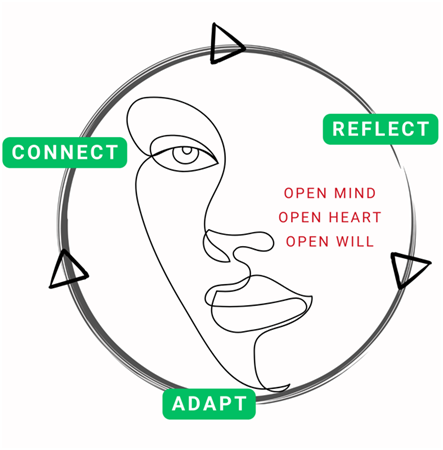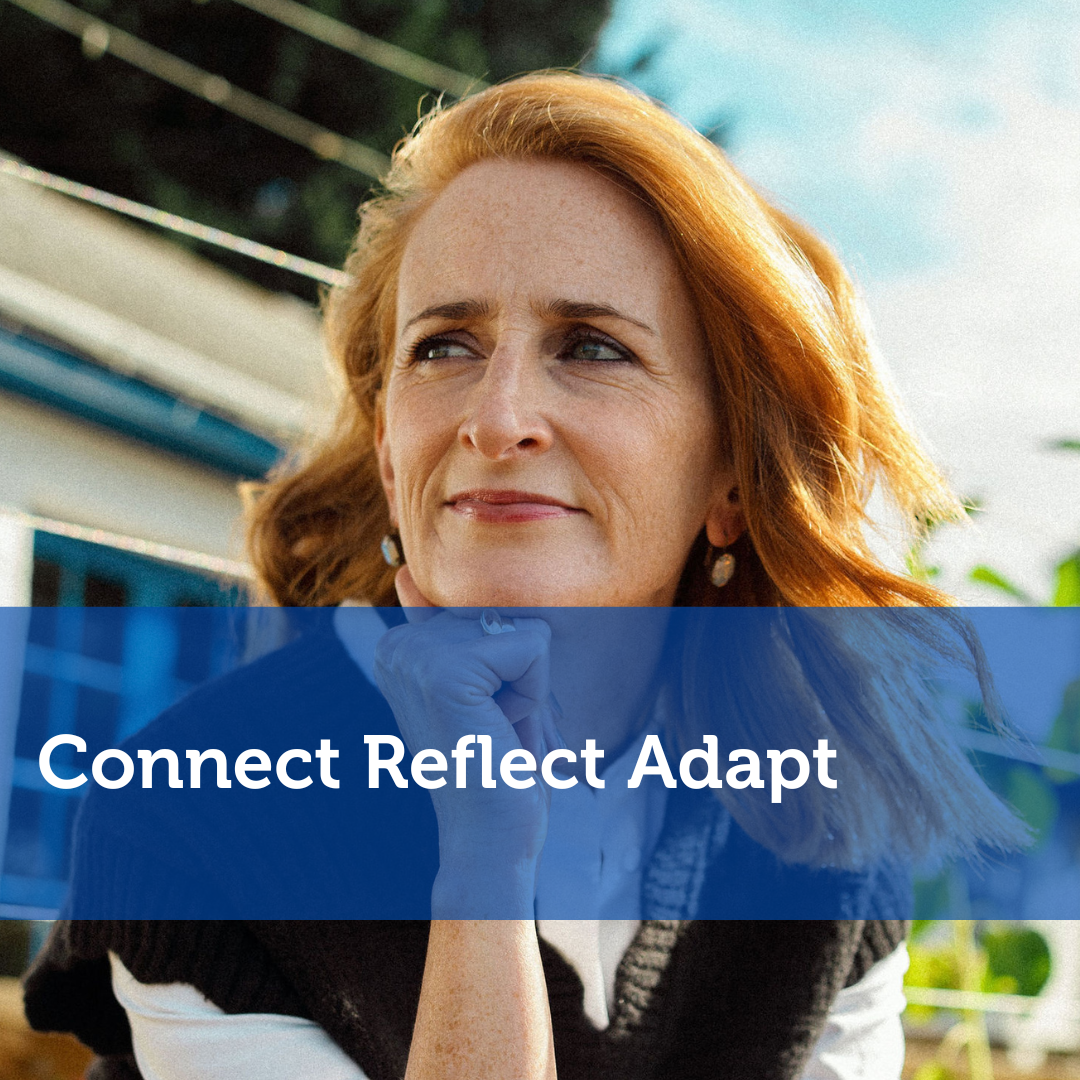A Coaching Model By Heather Madden, Mindset Coach, UNITED KINGDOM
A Roadmap for Coaches the Connect Reflect Adapt Coaching Model
Coaching Models offer a roadmap for coaches, outlining key stages and questions to explore with clients. This ensures a focused and productive coaching experience. They help avoid unstructured conversations and ensure all essential areas are addressed with the client.
My coaching model brings in elements of my own experience and the Theory U framework. Theory U, by Otto Scharmer, is a change management framework shaped like a U. It proposes a journey for individuals and organizations to navigate complex challenges and emerge into a more positive future. The journey through the U involves 3 main stages:
- Sensing
- Presenting
- Realizing
In addition, there are three qualities that are essential for navigating the Theory U journey that I think are necessary for any coach-client relationship: open heart, open mind, and open will.
The Connect Reflect Adapt Coaching Model Explanation
My coaching model has two parts:
- The coaching journey: Connect, reflect and adapt
- Coach and client mindset: Open heart, open mind, and open will.

The goal of each coaching session is to help the client connect to the problem, reflect on where they currently are, where they are going and why they are going there, and finally what they need to adapt to get there.
Connect
Starting by connecting to the problem helps both coach and client clearly define the issue at hand. This establishes a shared understanding and ensures everyone is on the same page. Understanding the specific problem prevents wandering discussions and keeps the session direction clear. The client can articulate their frustrations and challenges and start to understand the root cause of their problem, not just the symptoms. Starting with the problem also allows the coach to develop more empathy and understanding of the problem state.
- Help the client to understand their desired outcomes and aspirations.
- Delve into the client’s thoughts, feelings, and actions surrounding specific situations or challenges.
- Question assumptions and beliefs: Examine underlying patterns and thought processes that may be limiting growth.
Reflect
Reflection allows clients to reconnect with their core values and desires, ensuring their goals align with their true selves. This prevents the aimless pursuit of external expectations and fosters intrinsic motivation.
- Help clients to reflect on their core values, aspirations, and long-term goals. This helps them reconnect with their sense of purpose and what truly drives them. Guide clients in trusting and interpreting their inner wisdom.
- Self-compassion and acceptance: Guide them in practicing self-kindness and understanding towards themselves, especially during setbacks or challenges. This fosters resilience and empowers them to navigate difficulties.
- Setting boundaries and saying no: Support clients in establishing healthy boundaries to manage their time, energy, and workload. This allows them to prioritize self-care and avoid burnout.
Adapt
The coach’s role is to provide a safe and supportive space and a non-judgemental environment. This ensures the client can adapt and grow during the session. There should be progress towards the goal, even if the client doesn’t reach the goal during an individual coaching session.
- Help clients cultivate a growth mindset, focusing on learning and improvement from challenges. This fosters resilience and motivates them to adapt to changing circumstances.
- Help clients break down their goals into achievable micro-steps, reducing overwhelm and fear of failure. Celebrate small wins to maintain motivation and momentum.
- Ongoing self-discovery: Encourage continuous exploration of their inner selves through practices like journaling, reflection, and learning new skills. This promotes personal growth and helps them discover their full potential.
At the center of my model and coaching journey are the three elements that both the coach and client need to embody for a successful coaching session. Fostering this mindset will most likely lead to personal growth and development. “Inner knowing is the increasing self-awareness and intuitive knowing that is part of spiritual and emotional maturity” (Alexander, 2013). As a coach, it is our role to help and empower the client to connect to their inner experience and deeper self. This is often referred to as a “flow state” when the client is connected to something larger than themselves and experiences effortless action. This is what we would like to achieve in coaching and ensure our clients can find that insight and guidance from within.
- Open Heart: This refers to a state of compassion and empathy, allowing us to connect with ourselves and others without judgment. It creates a sense of trust and shared humanity, which is crucial for collaboration and change. It is often referred to as “accessing your discomfort” by Otto Scharmer.
- Open Mind: This means being curious and receptive to new ideas and perspectives. It involves letting go of fixed beliefs and assumptions and being willing to learn from experience. Openness allows us to tap into the full spectrum of possibilities and find creative solutions.
- Open Will: This is the commitment to action and embodiment. It’s about moving from insight to action, taking responsibility for our choices, and actively shaping the future. Open Will helps us translate our intentions into concrete steps and persevere in the face of challenges.
At any stage of the coaching session, if the coach feels that the client isn’t in the right mindset, or the client feels distracted or stressed then the following techniques can be used during the session to embody more presence.
- Meditation
- Journaling
- Gentle movement to tune into the physical sensations
- Breathwork, for example, a box breathing practice
- Visualisation practices
- Affirmation crafting
Learn How to Create Your Own Coaching Model
Your Coaching Model reflects your values,
philosophies, and beliefs and must communicate who you will coach
and the problems you will solve. Read more about creating your coaching model
References
Alexander, I., 2013. Knowing with Heart and Mind. Taking Rational Trouble Over the Mysteries: Reactions to Atheism, p.175.
Scharmer, Otto (2023), In Memory of Ed Schein; From Accessing Your Ignorance to Accessing Your Love, Journal of Awareness-based System Change, Volume 3, Issue 1, pp 9-16.
Scharmer, Otto (2018), The Essential of Theory U; Core principles and applications.
Schein, E. H. (2010). Helping: How to offer, give, and receive help. Berrett-Koehler Publishers.
